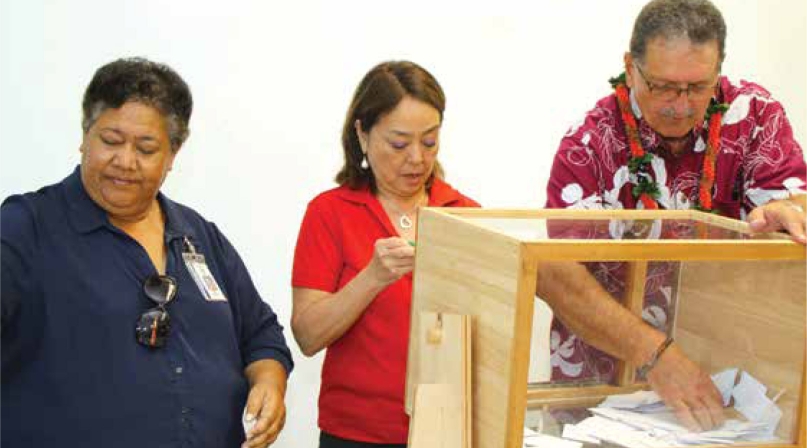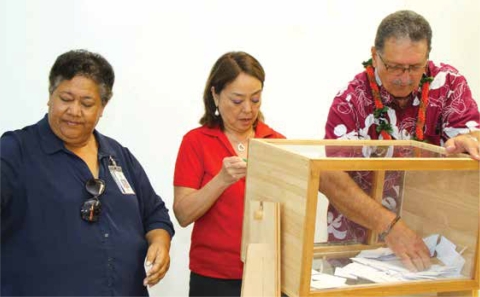Maui County lottery helps first-time homebuyers
Author
Upcoming Events
Related News

Key Takeaways
Residents in Maui County, Hawaii, are testing their luck to see if they will be chosen during a lottery as part of the county’s First-Time Home Buyer’s Down Payment Assistance Program.
“You can imagine the anxiety, the excitement just sitting there,” Maui County Mayor Michael Victorino said of the atmosphere during the lottery drawing where county residents wait to hear their name read aloud. Victorino and council members participate in the lottery by picking the names out of a spinning glass box.
“It’s like playing the lottery or playing bingo,” he said.
Maui County’s First-Time Home Buyer’s Down Payment Assistance Program helps county residents who are first-time homebuyers by providing funds for down payments or closing costs. During a lottery drawing process, eligible applicants are selected to receive funds.
The program was initially offered from 2009 to 2012. During that time, the maximum amount of assistance a county resident could receive was $15,000.
In the summer of 2018, the county council decided to allocate funding to the program again— and significantly more funding.
“Each year when the program was run previously, it had a total amount of $200,000 in it,” said Jessica Crouse, assistant housing administrator for Maui County. “Then, when county council decided to revive it last year, they allocated $2 million in funding to the program.”
The program is administered by the County Housing Division and funded in the current budget by the county as a general line item grant using taxpayer funds.
The revived program does not provide applicants a flat reward as in previous years, making it dependent on the applicant’s needs. Now, the program will fund up to $30,000 or 5 percent of the purchase price of the property, whichever is less, Crouse said.
“That ensures that all of the people that participate have an equitable opportunity to get the same percentage of support that they purchase,” she said.
Lori Tsuhako, director of the Department of Housing and Human Concerns, said the First-Time Home Buyer’s Down Payment Assistance Program can also be used to help families with closing costs in addition to making down payments, which are often the biggest barriers for families when it comes to obtaining a home.
The program has an open application period when anyone can apply to see if they are eligible. Some of the eligibility requirements include: An applicant cannot have owned a home in the last three years anywhere in the United States, cannot have an income greater than 140 percent of the area median income (currently $117,320); cannot have more than $75,000 in assets; must be a resident of Maui County at the time of application and must attempt to be a homeowner of a property in Maui County.
With $2 million, the county can help at least 66 individuals. In the most recent application round, the county received over 370 eligible applications out of 600 submitted.
During the lottery drawing, the first 66 names called are contacted to complete a formal application which allows the department to re-confirm they meet the eligibility requirements. Those drawn after the first 66 names are notified that they have been assigned to a waitlist. If the county determines there are funds available to support their applications, they’ll be contacted in the order they were drawn, Tsuhako explained.
Last year, the county was able to provide funds to names on the waitlist in the 70s.
Crouse said with the median sales price of homes exceeding $800,000 in the area, most individuals in the program do not purchase expensive homes but find properties that have been affordable with the support of the program.
Victorino added that with the housing crisis and high prices of homes, the program helps those who are “really on the cusp” of being able to qualify to become homeowners.
“This way I believe we can then give them this assistance to carry them over the top,” he said. “This will give them the opportunity to help pay their down payment which sometimes is the last piece of the puzzle they cannot fulfill.”
Tsuhako said creating a similar program to help first-time home buyers requires leadership, political will and commitment to building the community and giving families an opportunity to own a home.
“It’s really the county’s investment in community buildings,” she said.
According to Victorino, when the program first started, some weren’t keen on using taxpayer money to help others buy a home. Now, he said taxpayers are behind the program because they realize it keeps their families and friends in Maui County.
This is the second consecutive year the county has held the program after revitalizing it from 2012. Victorino said he has committed to funding the program each year he is in office.
“My advice to all the leaders is to look at everything and think big picture… What does it mean for 25 to 50 years down the road when those children of those children still are here, working here and being a part of the community?” he said. “[That] is our ultimate goal— that our grandchildren don’t move somewhere else and can be by us as we get older.”

Attachments
Related News

Counties and Railroads: Shared Priorities for the Next Surface Transportation Bill
County leaders from across the country have a vital opportunity to ensure their infrastructure priorities are front and center.


